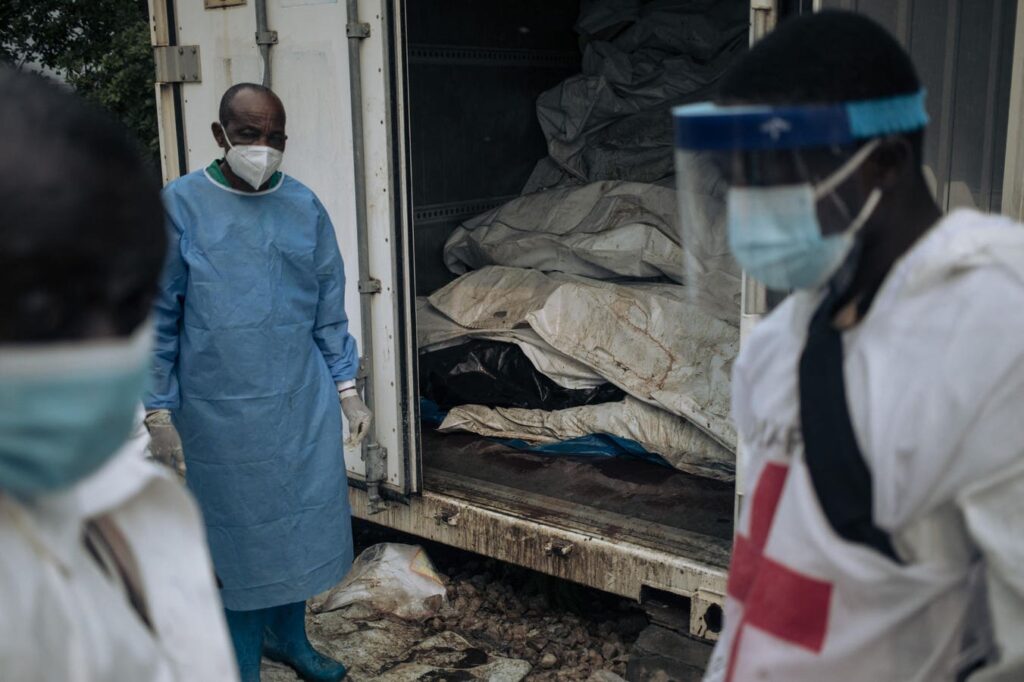[Graphic content] Members of the Congolese Red Cross store hundreds of bodies in containers in the … [+]
AFP via Getty ImagesOn January 31, 2025, United Nations agencies called for an end to the violence in the eastern Democratic Republic of the Congo (DRC) as fighting between Government forces and the Rwandan-backed M23 armed group intensified. The call comes after M23 rebels have already seized Goma, the provincial capital. Reports suggest that they are closing in on the city of Bukavu, the capital of South Kivu province. This has resulted in hundreds of thousands being forced to flee and seek safety in internally displaced persons (IDPs) camps.
The hostilities are being perpetrated in a mineral-rich region that has been volatile for decades amid a proliferation of armed groups. Thérèse Kayikwamba Wagner, Minister for Foreign Affairs, International Cooperation and Francophonie of the Democratic Republic of the Congo, speaking before the UN Security Council, stressed that the situation is not a conflict like others: “Rwanda is preparing to orchestrate a carnage in broad daylight. (…) It is clear that this crisis is directly linked to the economic plunder of our country by Rwanda.” She explained that over 150 tons of coltan are illegally extracted and transported to Rwanda each month, where they are fraudulently labeled for export. However, she further added that while this illicit commerce finances the military activities of armed groups, it is only one aspect of the aggression carried out by Rwanda.
UN reports that the intensifying hostilities have been sending shockwaves through the communities, with IDP camps emptying as people flee the violence. Medical services are overwhelmed by the numbers of those injured, including civilians. The World Food Program (WFP) warns that water and food are running low due to the ever-growing needs. Furthermore, several WFP warehouses have been looted further adding to the crisis.
The human rights situation is deteriorating by the minute. At least two sites for IDPs have been bombed, resulting in civilian casualties. The Office of the High Commissioner for Human Rights (OHCHR) documented summary executions of at least 12 people by the M23 between January 26 and 28. The Office has also documented cases of conflict-related sexual violence (CRSV) allegedly perpetrated by the army and allied Wazalendo fighters in Kalehe, South Kivu. The Office is in the process of verifying reports of 52 women being raped (including gang raped) by Congolese troops in South Kivu. In other regions under M23 control in South Kivu, such as Minova, the militia has been occupying schools and hospitals, and forcing IDPs out of camps. DRC officials report that at least 165 women were raped by male inmates during the mass prison break from Goma’s Muzenze prison on 27 January.
The International Organization for Migration (IOM) has raised alarm about the impact of the hostilities on the communities, with some of them being forcibly displaced yet again: “Millions of people were already displaced by years of conflict in eastern DRC, and humanitarian needs were massive. With the current alarming upsurge in fighting, an already dire situation is rapidly becoming very much worse. IOM joins the UN Secretary-General’s call for an immediate cessation of hostilities and full humanitarian access, so that we can rapidly scale up our response and ensure that life-saving aid reaches those in need.” The World Health Organization (WHO) reported that 700 people have been killed and 2,800 injured are receiving treatment in health facilities.
In response to the deteriorating situation, MONUSCO, a UN peacekeeping mission in the DRC, has been increasing its political engagement with the Congolese authorities. A joint Government-MONUSCO group was created to coordinate various issues, including the issues of security, human rights, humanitarian responses and the legal status of the territories under the control of the M23 and the Rwandan Defense Forces (RDF), among others. Further engagement includes meetings of the UN Security Council, summits by the East African Community (EAC) and the Southern African bloc SADC, and a meeting of the African Union’s Peace and Security Council, among others.
Similarly, several States called for the end of hostilities. Among others, the U.K. called for the immediate withdrawal of all RDF from Congolese territory. On January 26, the U.K. Foreign Secretary told President Kagame that an attack on Goma would provoke a strong response from the international community. U.S. Ambassador Dorothy Shea, Chargé d ’Affairs ad interim, when speaking at a UN Security Council Briefing on the Democratic Republic of the Congo, emphasized that: “We call for an immediate ceasefire and end to this fighting. Rwanda must withdraw troops from the DRC. Rwanda and the DRC must return to the negotiating table and work toward a sustainable, peaceful solution.”
Rwandan representatives, speaking before the UN Security Council, blamed the DRC for the deteriorating situation: “The current crisis could have been averted had the DRC Government demonstrated a genuine commitment to peace.”
The situation in the DRC requires urgent responses, including a political one, but above all, humanitarian assistance to all victims/survivors of the hostilities.
Read the full article here


